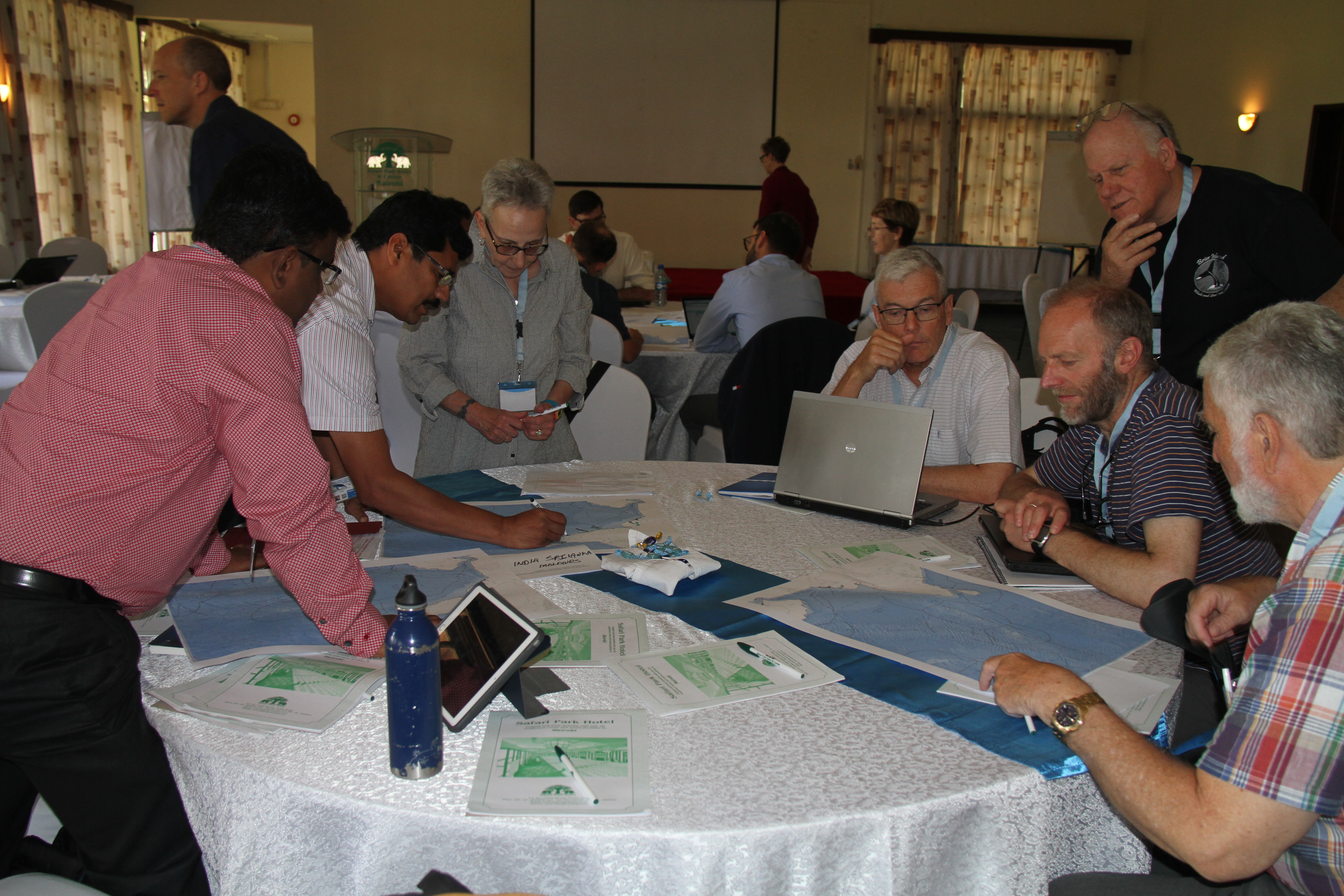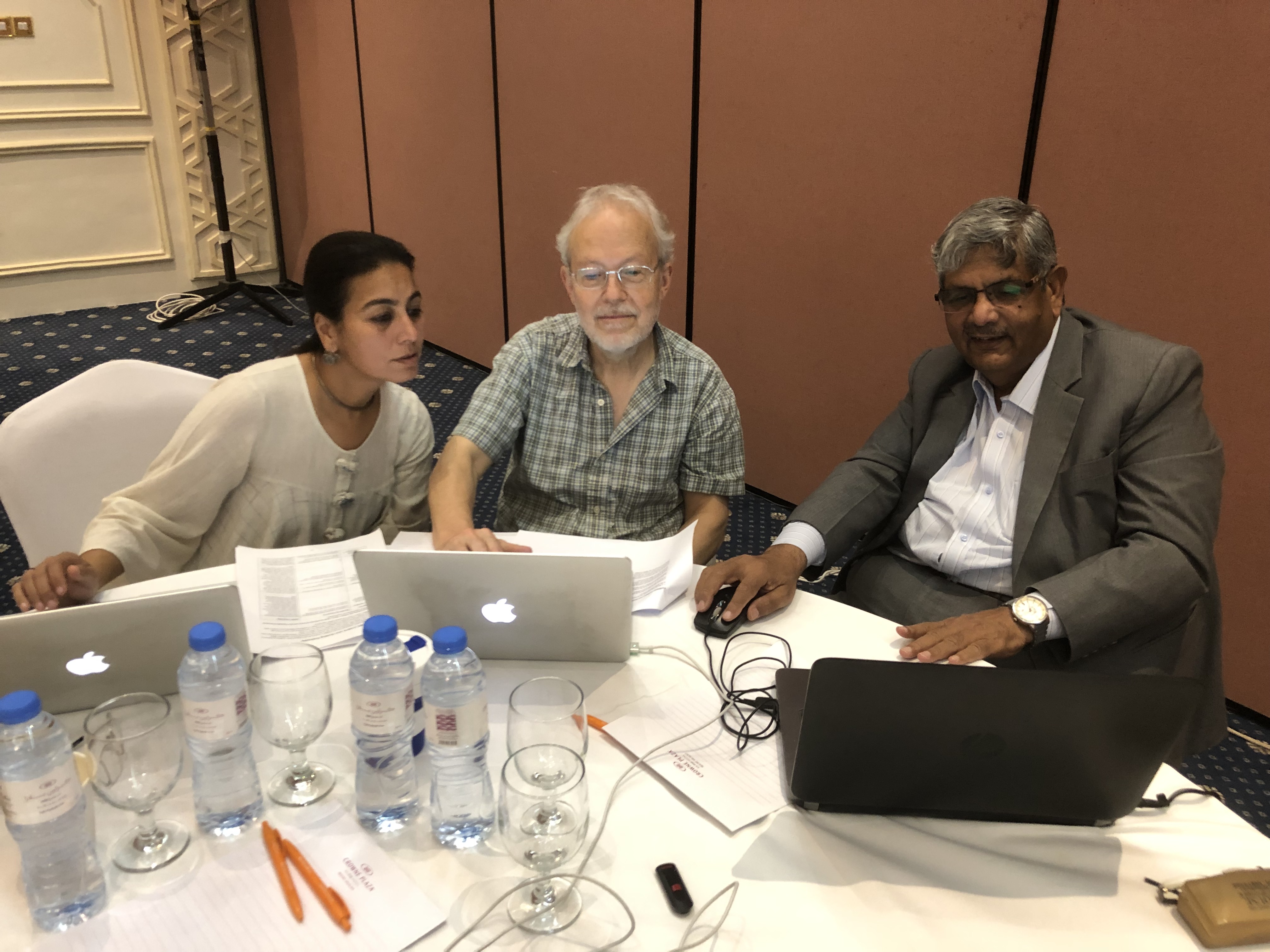
Participants to the IWC Workshop on Bycatch Mitigation Opportunities in the Western Indian Ocean and Arabian Sea. May 7-9, 2019, Nairobi.
This week two new workshop reports have been released, each containing a wealth of valuable information related to conservation of cetaceans in the Western Indian Ocean and Arabian Seas. The first is the Report of the IWC Workshop on Bycatch Mitigation Opportunities in the Western Indian Ocean and Arabian Sea. It is available for download by following this link https://iwc.int/bycatch-mitigation-in-the-indian-ocean-iwc or directly through the IWC archive https://archive.iwc.int/pages/view.php?ref=9612&k=
This workshop, which was held in Nairobi in conjunction with the IWC Scientific Committee meeting was funded by generous contributions from the Government of France, the US Marine Mammal Commission, the Pew Foundation, the Western Indian Ocean Marine Science Association. It included a range of presentations on innovative approaches to assessing, monitoring and mitigating bycatch, as well as some hands-on sessions where participants worked together to identify potential bycatch hotspots, where further research and mitigation efforts can be directed. The workshop resulted in a number of recommendations for collaborative work to reduce bycatch in the region. A few key recommendations are pasted in the table below.

The second Report of note is the Preliminary report of the Workshop on identification of Important Marine Mammal Areas (IMMAs) in the Western Indian Ocean and Arabian Seas. This report can be downloaded here:
Candidate IMMA proposals drafted during that workshop are in the final stages of review and revision. Once the final IMMAs and Areas of Interest have passed the independent reviewers and correspondence concluded with those needing further information, the IMMAs and AoI will be placed on the IMMA e-Atlas with background PDFs for each IMMA. Once that is in place, a final report will be issued with the final numbers and list of IMMAs and AoI for the region.
Both workshops involved a number of ASWN members, and allowed them to share their knowledge and expertise, while also learning from ‘neighbours’ working in other parts of the Indian Ocean. Both workshops also paved the way forward to continued and increased collaboration to address the challenges of protecting cetaceans and their habitat.

ASWN members Dipani Sutaria and Mohammed Moazzam Khan work with IMMA Chair, Erich Hoyt on proposals for Important Marine Mammal Areas in India and Pakistan.
Summary of Recommendations of the IWC Bycatch Workshop:
- The workshop recommends that governments in the Indian Ocean region establish or strengthen bycatch assessment and reduction programmes as a matter of urgency, with priority on bycatch hotspots areas identified across the region. Associated actions could include rapid risk assessments, on-board data collection, mitigation trials (experimental and existing measures) and/or implementation of effective management measures.
- The workshop recommends that governments and other relevant stakeholders in the Indian Ocean region carry out cetacean sampling surveys to collect information on species abundance and distribution at national and regional scales and encouraged that this information could be shared with the IWC Scientific Committee.
- The workshop recommends that the IWC (including through its Conservation Committee) develop and communicate recommendations to governments on the importance of addressing bycatch through policies and other measures that support bycatch mitigation efforts, and of more coherent approaches across government departments with different mandates; and promotes the sharing of information and experience between its contracting members.
- The workshop recommends that the BMI assist bycatch reduction efforts in the Indian Ocean region, including through:
- raising awareness and prioritisation of addressing cetacean bycatch in small to medium-scale gillnet fisheries through its engagement with member countries and other IGOs and NGOs;
- developing a regional road map for bycatch reduction (including assessment, monitoring and mitigation) in collaboration with other relevant bodies (e.g. FAO, IOTC, CMS, national governments);
- providing technical assistance to countries to assess different aspects of cetacean bycatch (e.g. monitoring, assessment, mitigation) and support and promote multidisciplinary monitoring (e.g. social science techniques, economics) and mitigation approaches, including though capacity building;
- exploring means of more consistent and sustainable approaches for funding of bycatch mitigation efforts.
- The workshop recommends that bycatch reduction efforts employ a multi-disciplinary and multi-taxa approach at local, national and international scales.
National Governments in the Indian Ocean region; scientific research community; - The workshop recommends that the BMI provides technical assistance to governments and other relevant stakeholders within the Indian Ocean region in the design of experimental mitigation trials that are both scientifically rigorous and which supports the livelihoods of fishing communities, as far as is possible.
- The workshop recommends that the IWC (through the BMI and through its conservation and scientific committees) assist efforts to communicate scientific and conservation advice to decision makers in collaboration with other inter-governmental organisations and non-governmental organisations.
- The workshop recommends to governments and other relevant stakeholders in the Indian Ocean region that bycatch monitoring and reduction efforts use (where appropriate) crew-based approaches for collecting data on bycatch and mitigation measures (including where observer programmes are not feasible due to the size of vessel, the large numbers of small and medium-scale fishing vessels, trip length, safety concerns etc).
- The workshop recommends that the BMI assist national efforts by developing a toolbox of more effective tools for communication with fishing communities and associations including the promotion of fisher-exchanges to share experiences of bycatch mitigation efforts and efficacy.
- The workshop recommends renewed efforts by the research community and fisheries technologists in the research and development of low-cost bycatch mitigation and monitoring solutions, particularly for gillnet fisheries and the scaling-up of testing of existing measures (e.g. lights and acoustic deterrents, and experimental low-tech tools) in different fisheries and locations.
- The workshop recognised the importance of capturing socio-economic information as part of a holistic and multi-disciplinary approach, and therefore recommends to countries that monitoring and mitigation programmes should also integrate collection of economic data (CPUE, catch value etc) to be collected and analysed alongside bycatch information.
- The workshop recommends that governments in the Indian Ocean region consider pro-active reassurance to fishers that there will not be negative consequences in response to reporting bycatch and furthermore recommends to use fisher reported data for monitoring and bycatch management purposes rather than for compliance and enforcement.
- The workshop recognised the growing importance of REM methods and the possibility for cost-effective monitoring at a fleet-scale, and therefore recommends that governments and relevant stakeholders in the Indian Ocean region engage in trialling REM approaches for bycatch monitoring, including low-cost methods for small and medium-scale vessels (and in other vessels as appropriate).
- The workshop recommends that the BMI provide technical assistance upon request on the REM systems available and their applicability to a specific situation.
- The workshop concluded that there was an important need to raise the profile of cetacean bycatch and promote bycatch reduction efforts within the context of RFMOs, and specifically within the Indian Ocean and it therefore recommends that:
- The BMI engage more formally and more regularly with the IOTC, the South West Indian Ocean Fisheries Commission (SWIFOC) and other relevant RFMOs, including in collaboration with other relevant organisations, to encourage more discussion and action of cetacean bycatch monitoring and mitigation in the fisheries under their management. This could be achieved through direct observer status and/or the appointment of regional representatives/contacts to maintain an overview of relevant RFMO meetings and opportunities to participate and/or present information.
- IWC Contracting Governments undertake further efforts to improve the quality and quantity and reliability of cetacean bycatch data reported to the IOTC and to other bodies (including the IWC national reports) and for small-scale fisheries.
- Bycatch Mitigation Initiative; IWC Conservation Committee; IWC Secretariat; National governments in the Indian Ocean region
- That the BMI support where appropriate contracting and non-contracting governments in the exchange of cetacean bycatch information and experiences between neighbouring countries and support the development of transboundary approaches including through BMI engagement with RFMOs
- That the BMI explore its potential to assist countries in fulfilling their reporting requirements under IOTC, as well as the potential for greater sharing of information on bycatch between the IWC and FAO/the RFMOs.
